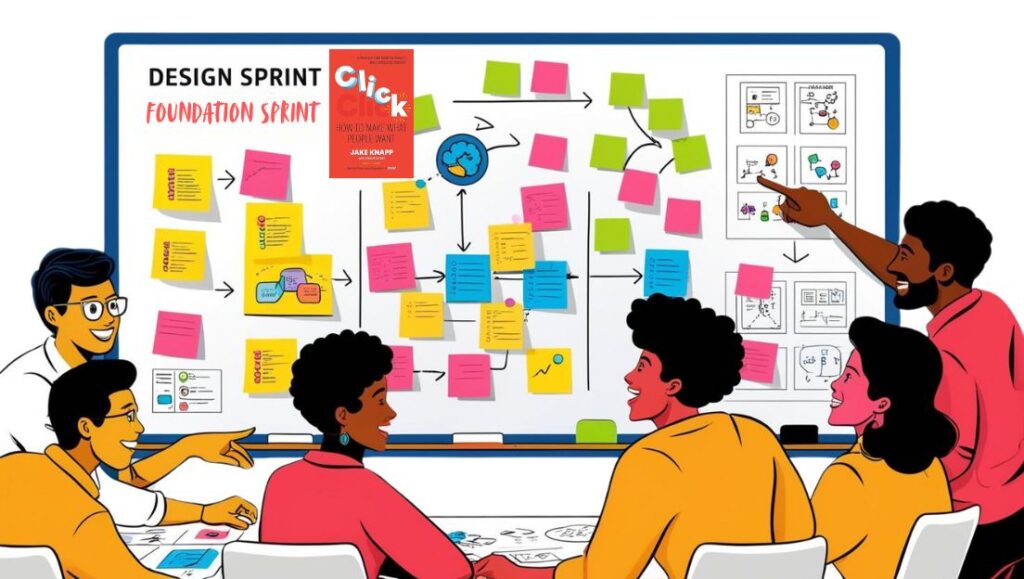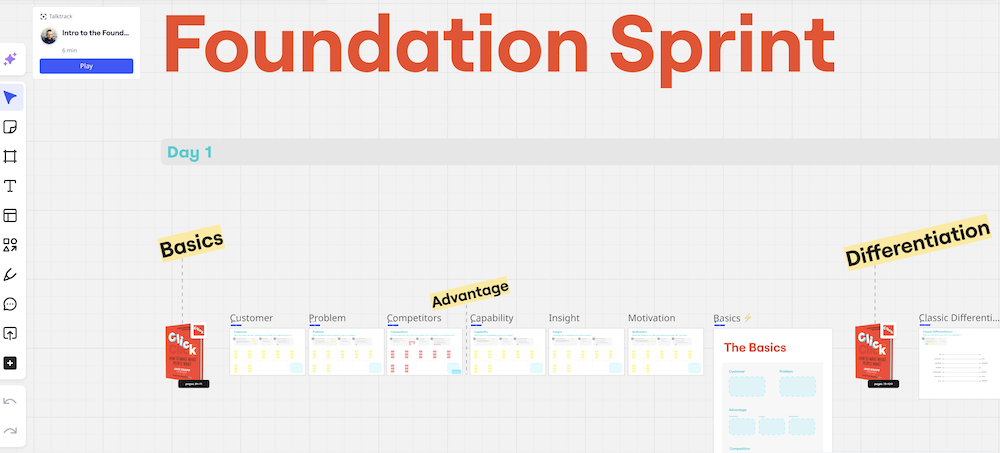What is the Foundation Sprint?
The Foundation Sprint is a fast-paced, two-day workshop designed to give teams strategic clarity before jumping into building or solution development. Created by Jake Knapp and JZ (John Zeratsky), the Foundation Sprint serves as the critical precursor to the classic Design Sprint. It helps teams align on what matters most: the customer, the problem, differentiation, and the best path forward.
While traditional Design Sprints are solution-focused, the Foundation Sprint is about setting the foundation, answering “what are we doing and why?” with clarity and confidence. A Foundation Sprint workshop or training can be done live and in-person or virtually on Miro with the Foundation Sprint Miro virtual whiteboard.
The Book Click by Jake Knapp & JZ
The methodology behind the Foundation Sprint is detailed in Click: How to Make What People Want. In it, Knapp and Zeratsky build on their Google Ventures Sprint experience to show that the real bottleneck isn’t lack of creativity—it’s lack of clarity.
The book shares how teams can make fast, smart decisions using structured collaboration tools like “Note-and-Vote” and “Magic Lenses.” The Foundation Sprint embodies these principles, making strategy work doable and repeatable, even in fast-moving environments.

Foundation Sprint Workshop Agenda: What to Expect
Day 1 – Clarify the Basics & Differentiate
1. Kickoff & Reset
Introduce the process and “Work Alone Together” mindset.
Reinforce that we’re seeking clarity, not perfection.
2. The Basics
Customer: Who are we trying to help?
Problem: What’s the most critical problem we can solve?
Advantages: What capabilities, insights, and motivations make our team suited to solve it?
Competition: Who are our competitors, substitutes, or the “do nothing” option?
Use the Note-and-Vote method to prioritize quickly and inclusively.
3. Differentiation
Map your solution against Classic Differentiators (fast, easy, free).
Create Custom Differentiators using spectrum templates.
Build a 2×2 chart to visualize how your solution uniquely stands out.
4. Mini Manifesto
Draft 2–3 Practical Principles to guide decision-making.
Summarize everything into a clear Mini Manifesto.
Day 2 – Explore Approaches & Choose a Path
5. Generate Approaches
Brainstorm different formats for solving the problem (service, product, tech, etc.).
Create one-page summaries with headlines, descriptions, and doodles.
6. Evaluate Options with Magic Lenses
Use Customer, Pragmatic, Growth, and Money lenses to assess each option.
Customize the lens labels to match your team’s values.
7. Create Custom 2x2s
Build charts using top criteria (e.g., “easy to build” vs. “high long-term value”) to find your best strategic fit.
8. Zoom Out and Choose
The Decider picks one Top Bet and one Backup Plan.
9. Fill Out the Founding Hypothesis
Capture your strategic clarity in one final statement:
“If we help [customer] solve [problem] with [approach], they’ll choose it over [competition] because [differentiation].”
Training Tools to Facilitate Your Foundation Sprint
To guide your team smoothly, we recommend using the full Foundation Sprint Toolkit, which includes:
📘 Foundation Sprint Workbook – a step-by-step facilitation guide
📋 Fillable Templates – for the whiteboard or virtual collaboration in tools like Miro
🎯 Preformatted Spectrums and Charts – including lenses for evaluating ideas and approaches
These resources help you keep momentum, reduce friction in decision-making, and turn group input into a clear path forward.
Why Foundation Sprints Matter
A Foundation Sprint is perfect if your team struggles with:
Too many competing ideas
Vague goals or conflicting priorities
Difficulty explaining why your product or idea matters
Lack of alignment before investing resources
By taking two focused days, you can gain months of clarity—and avoid costly pivots down the road.
The Original Design Sprint vs. Foundation Sprint
While the Design Sprint focuses on prototyping and testing solutions in just five days, the Foundation Sprint is all about aligning strategy up front. Here’s how they compare:
| Feature | Foundation Sprint | Design Sprint |
|---|---|---|
| Focus: | Strategy, clarity, prioritization | Solution development & testing |
| Duration: | 2 days | 5 days |
| Key Output: | Founding Hypothesis | Validated prototype |
| Typical Use Case: | Early stage of big project | Mid-stage when testing is needed |
| Mode: | Structured decisions | Iterative prototyping and user testing |
Let’s Work Together: Custom Foundation Sprint Workshops & Training
We offer customized Foundation Sprint Workshops for teams at any stage of innovation. We can even lead you through the foundation of the Foundation Sprint.
Whether you want a full-service facilitated experience or hands-on training to lead your own, we’re here to help. We can even recommend Facilitation Sprint facilitators in different regions of the world.
✅ Run a live Foundation Sprint with expert facilitators
✅ Train your team to lead the sprint in-house
✅ Integrate Miro and digital templates for remote or hybrid teams
Contact us to schedule a discovery call or learn more about our facilitation packages.
